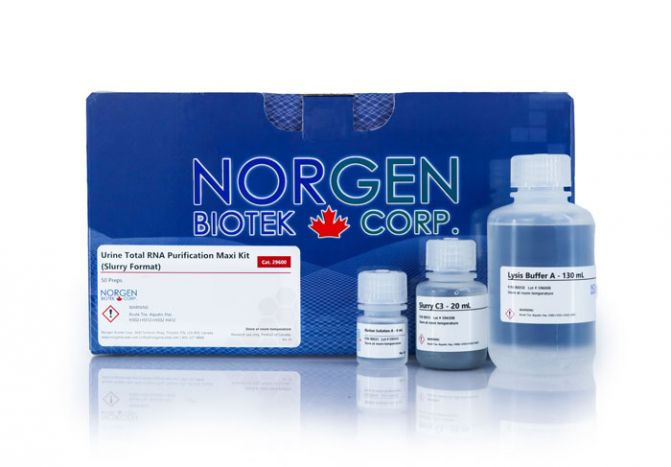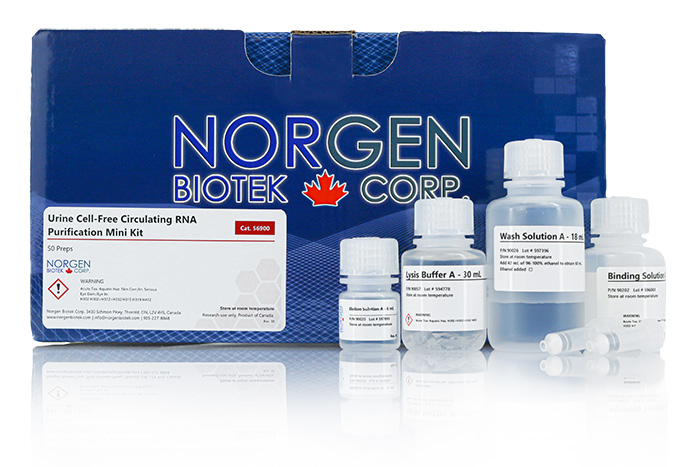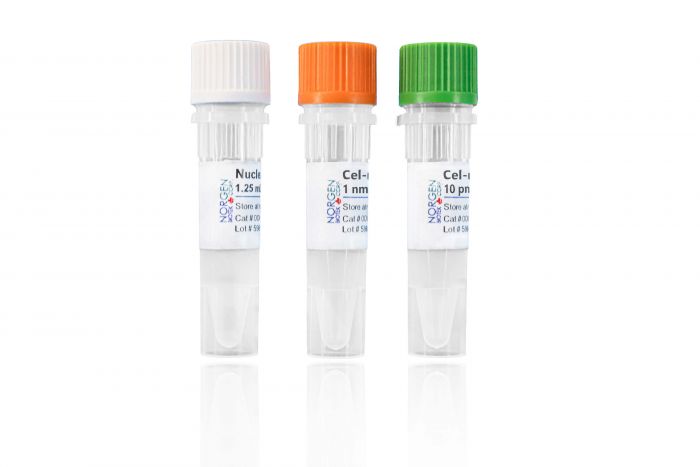Urine microRNA Purification Kit
Rapid purification of microRNA from urine without phenol

For research use only and NOT intended for in vitro diagnostics.
Urine microRNA Purification Kit
Rapid purification of microRNA from urine without phenol
Register today to receive an exclusive 15% off* on your first order.
Features and Benefits
- Isolate high quality total RNA (including small RNA and microRNA) and all sizes of circulating and exosomal RNA, including microRNA from urine and cerebrospinal fluid (CSF) samples
- Small urine and CSF input ranging from as low as 0.5 mL to 1 mL
- No phenol extractions
- Very sensitive and linear down to a few cells without the need for carrier RNA
- Bind and elute all RNA irrespective of size or GC content, without bias
- Rapid and convenient spin column protocol
- Purification is based on spin column chromatography that uses Norgen’s proprietary resin separation matrix
Norgen’s Urine microRNA Purification Kit provides a rapid method for the isolation and purification of small RNA molecules (All sizes, including < 200 nt) from urine samples. These small RNAs include regulatory RNA molecules such as microRNA (miRNA) as well as tRNA and 5S rRNA. Small RNA molecules are often studied due to their ability to regulate gene expression. Typically miRNAs are 20-25 nucleotides long and regulate gene expression by binding to mRNA molecules and affecting their stability or translation. Several recent studies have shown that miRNA regulates cell growth and apoptosis. Furthermore, clinical and experimental analyses suggested that miRNAs may function as a novel class of oncogenes or tumor suppressor genes. MicroRNA expression profiles of different tumor types, relative to their normal tissues, have recently been shown to provide phenotypic signatures for particular cancer types. Unique patterns of aberrant miRNA expression may serve as molecular biomarkers for tumor diagnosis, prognosis of disease-specific outcomes, and prediction of therapeutic responses.
Details
Supporting Data
Figure 1. Isolation and Detection of microRNA from Urine Samples. Norgen's Urine microRNA Purification Kit was used to isolate microRNA from 8 different 1.5 mL urine samples. The purified microRNA was then used as the template in an RT-qPCR reaction to detect the human miR-21 gene. Five microlitres of the isolated RNA were used as the template in the RT step, and 5 µL from the RT step was used in the qPCR reaction. As it can be seen, the qPCR was able to successfully detect and amplify the miR-21 gene in all cases, indicating the high quality of the isolated urine microRNA. The black line in the graph above corresponds to the No Template Control.
|
Kit Specifications
|
|
|
Volume of Urine Processed
|
0.5 - 1 mL
|
| Size of RNA Purified | All sizes, including < 200 nt |
| Time to Complete 10 Purifications |
< 30 minutes
|
Storage Conditions and Product Stability
All solutions should be kept tightly sealed and stored at room temperature. This kit is stable for 2 years after the date of shipment.
| Component | Cat. 29000 (25 preps) |
|---|---|
| Lysis Buffer A | 2 x 20 mL |
| Wash Solution A | 18 mL |
| Elution Solution A | 6 mL |
| Mini Spin Columns | 25 |
| Collection Tubes | 25 |
| Elution Tubes (1.7 mL) | 25 |
| Product Insert | 1 |
Documentation
FAQs
Spin Column
RPM= √RCF/(1.118x10-5)(r)
Where RCF = required gravitational acceleration (relative centrifugal force in units of g); r = radius of the rotor in cm; and RPM = the number of revolutions per minute required to achieve the necessary g-force.
- RNase contamination
RNases may be introduced during the use of the kit. Ensure proper procedures are followed when working with RNA. Please refer to “Working with RNA” at the beginning of this user guide.
- Procedure not performed quickly enough
In order to maintain the integrity of the RNA, it is important that the procedure be performed quickly.
- The cells are old
Older samples contain prematurely lysed cells which release RNase and can degrade RNA. Fresh urine samples are recommended.
We recommend the following steps to prepare frozen urine for isolation:
- Gently warm the sample to room temperature or 37°C for 5 min.
- DO NOT perform a centrifugation step after thawing frozen cell-free Urine samples - this will eliminate the precipitated proteins leading to loss of protein-bound cf-NA or exosomes.
- Proceed with the protocol.
We recommend the use of Norgen’s Urine Preservative when collecting urine samples. Norgen’s Urine Preservative is designed for the preservation of nucleic acids and proteins in fresh urine samples at ambient temperatures, therefore no protein precipitation will occur and the purified nucleic acids will be of a higher quality.
Citations
| Title | Feasibility of urinary microRNA detection in breast cancer patients and its potential as an innovative non-invasive biomarker |
| Citation | BMC Cancer 2015. |
| Authors | T Erbes, M Hirschfeld, G Rucker, M Jaeger, J Boas, S Iborra, S Mayer, G Gitsch, E Stickeler |
| Title | MicroRNAs in urine are not biomarkers of multiple myeloma |
| Citation | Journal of Negative Results in BioMedicine 2015. |
| Authors | Lenka Sedlaríková1,2, Lenka Bešše1,3, Sona Novosadová1 , Veronika Kubaczková1,2, Lenka Radová4 , Michal Staník5 , Marta Krejcí 6 , Roman Hájek1,2,7 and Sabina Ševcíková1,2* |
| Title | Noninvasive urinary miRNA biomarkers for early detection of pancreatic adenocarcinoma |
| Citation | Am J Cancer Res 2015. |
| Authors | Silvana Debernardi1 , Nathalie J Massat2 , Tomasz P Radon1 , Ajanthah Sangaralingam1 , Ana Banissi1 , Darren P Ennis1 , Thomas Dowe1 , Claude Chelala1 , Stephen P Pereira3 , Hemant M Kocher4,6, Bryan D Young5 , Giles Bond-Smith6 , Robert Hutchins6 , Tatjana Crnogorac-Jurcevic1 |
| Title | Urinary microRNA-29 correlates with urinary albumin in type 2 diabetes mellitus |
| Citation | Chinese Journal of Nephrology 2014. |
| Authors | Z Meirong, P Hui, Z Wenbo, W Cheng, Z Jun, L Xun, L Yuanqing, SD Paudel, W Qianqian |
| Title | A microarray analysis of urinary microRNAs in renal disease |
| Citation | Clinical and Experimental Nephrology 2013. |
| Authors | T Konta, K Ichikawa, K Suzuki, K Kudo, H Satoh |
| Title | Urinary miR-29 Correlates with Albuminuria and Carotid Intima-Media Thickness in Type 2 Diabetes Patients |
| Citation | PLoS ONE 2013. |
| Authors | H Peng, M Zhong, W Zhao, C Wang, J Zhang, X Liu, Y Li, SD Paudel, Q Wang, T Lou |




